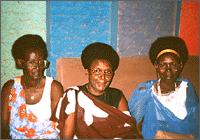|
|
 |
 |
My
name is Louise Mushikiwabo. I was born and raised
in Rwanda, where I graduated from the National University
of Rwanda’s Foreign Languages department. In
the summer of 1985, I got a job teaching English
at Lycée de Kigali High School in the capital.
In 1986, at the age of 24, I received a scholarship
from the University of Delaware to pursue graduate
studies in French and Conference Interpretation.
After graduation, I got a job working in public
relations in Washington, D.C. That’s what I
was doing in 1994 when, on April 6, an airplane
carrying Juvenal Habyarimana, the president of Rwanda,
was shot down.
|

Three
killed in the genocide, 1992
right to left: Louise's mother , aunt and friend.
Courtesy Louise Mushikiwabo |
In the wake of the shooting, the nationalist Hutu militia
in Rwanda, the Interahamwe, went on deadly rampage across
the country, slaughtering members of the Tutsi ethnic
group and any moderate Hutus who might have sympathized
with them. Over the next three months, they murdered somewhere
between 500,000 and a million people, including most of
my family.
My life, as you might imagine, was turned upside down.
I came from a middle-class Tutsi family with no political
ties until 1991, when one of my brothers, a University
professor named Lando Ndasingwa, decided to join the pro-democracy
movement. Eventually he became the government’s Minister
of Labor and Social Affairs, and was the only Tutsi in
the cabinet when the genocide started. He had been active
in trying to facilitate the return of Tutsi refugees living
in neighboring Uganda and was always vocal on behalf of
equal treatment for the country’s minority groups.
Thus, I feared that he might be one of the Interahamwe’s
primary targets. My fear was borne out.
As news reports trickled in that the Interahamwe were
hacking people to death with machetes, I feared the worst.
I was on the phone day and night with my family. But early
in the morning Washington time on April 7, the phone lines
to all of my relatives in Rwanda went dead. The following
day I read in a wire story that my brother was missing
and presumed dead. I was devastated. But what I did not
know was that my brother was not the only one I lost.
The Interahamwe also killed my mother, two other brothers,
one of my nieces, five nephews and two of my sisters-in-law.
|
|
|
|


